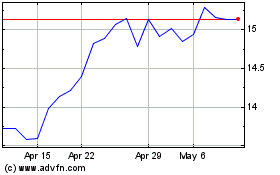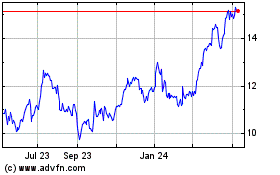How a Merger Between Deutsche Bank and Commerzbank Stacks Up
March 25 2019 - 5:59AM
Dow Jones News
By Patricia Kowsmann
FRANKFURT -- Despite spending billions of dollars to steady
their fortunes and try to remain independent, Deutsche Bank AG and
Commerzbank AG are now weighing a merger.
A spell of acute weakness across the sector means a reluctant
marriage could be the best result the struggling lenders can hope
for. That said, it is still possible -- some observers say even
likely -- that no deal happens.
If a deal is reached, it could do more than shore up the banks
themselves: The formation of a national banking champion would give
much-needed support to Germany's economy when the outlook is
bleak.
Here we lay out how the German banking industry and the two
banks stack up.
Germany's banking market is fragmented. At 1,600, the country
has more banks than the U.K., France, Italy and Spain combined.
The so-called "three-pillar" banking system comprises about 200
commercial banks, including Deutsche Bank and Commerzbank, some 400
state-owned local savings banks and more than 900 cooperative banks
owned by their 18 million account holders -- one in four Germans.
As a result, Deutsche Bank and Commerzbank each have a small market
share in domestic lending.
The stiff competition has added to pressure on the banks'
profitability.
Both banks are among the least profitable in the eurozone.
Commerzbank's return on tangible equity, a key measure of
profitability, is only slightly higher than that of beleaguered
Italian bank Monte dei Paschi di Siena SpA. Deutsche Bank's is
sharply lower.
Unlike Commerzbank, Deutsche Bank has a big investment-banking
business, which has been hit by volatility and has lost market
share to healthier U.S. competitors.
A combination of Deutsche Bank and Commerzbank would create the
eurozone's second-largest bank by assets, after France's BNP
Paribas SA. Their market share on domestic lending and deposits
would rise to between 10% and 15%, according to Fitch Ratings.
Deutsche Bank, whose funding costs have increased on low
investor confidence in its business, would also benefit from
Commerzbank's additional pool of retail deposits and cheaper
funding.
But skepticism about the benefits of the merger is widespread.
"In our view a combination of these two low return-on-equity
generating banks is unlikely to lead to improvement in earnings in
the short term, leading to a bigger balance sheet [and] higher
capital requirements," JPMorgan said in a recent note.
Just how much fresh capital the European Central Bank, which
supervises both lenders, would require to sustain such a big bank
is still unknown and will largely depend on what kind of bank were
created from any merger.
"If a merger is put forward to us, our sole focus is to access
the viability and the sustainability of the project," ECB banking
chief Andrea Enria told EU lawmakers Thursday. "It boils down to
making sure that the resulting entity is able to comply with the
supervisory requirements."
Deutsche Bank and Commerzbank would also have to convince their
shareholders that a tie-up, which would likely dilute their
holdings, would be good for them.
While Commerzbank has the blessing of its largest shareholder --
the German government -- Deutsche Bank must deal with Chinese
conglomerate HNA Group Co., which owns 6.3% of the bank, and the
Qatari royal family, which has a 6.1% stake through separate
Qatari-controlled vehicles.
Cerberus Capital Management LP, a top investor in both Deutsche
Bank and Commerzbank, has signaled it won't stand in the way of a
deal, according to a person familiar with the firm. BlackRock,
which also has stakes in both banks, is generally skeptical about
the benefits of combining the two banks, but like other investors
wants details of how a deal would look before making any decision,
according to a person briefed on the matter. Both have seen the
value of their stocks fall sharply overtime.
A vocal objector to a deal is services-sector labor union Verdi,
which has representatives in the supervisory board of both banks
and said up to 30,000 out of roughly 140,000 positions could
disappear under the merger.
"We reject a possible merger of both houses with a view to
endangering tens of thousands of jobs," said Jan Duscheck, a Verdi
representative.
While Berlin has signaled it would back job cuts, analysts are
skeptical that the banks will be able to deliver a leaner company
quickly. Germany's labor rules are notoriously stringent, making
layoffs difficult and costly. Both Deutsche Bank and Commerzbank
have struggled to absorb other banks they have bought in the
past.
Write to Patricia Kowsmann at patricia.kowsmann@wsj.com
(END) Dow Jones Newswires
March 25, 2019 05:44 ET (09:44 GMT)
Copyright (c) 2019 Dow Jones & Company, Inc.
Commerzbank (PK) (USOTC:CRZBY)
Historical Stock Chart
From Jun 2024 to Jul 2024

Commerzbank (PK) (USOTC:CRZBY)
Historical Stock Chart
From Jul 2023 to Jul 2024
